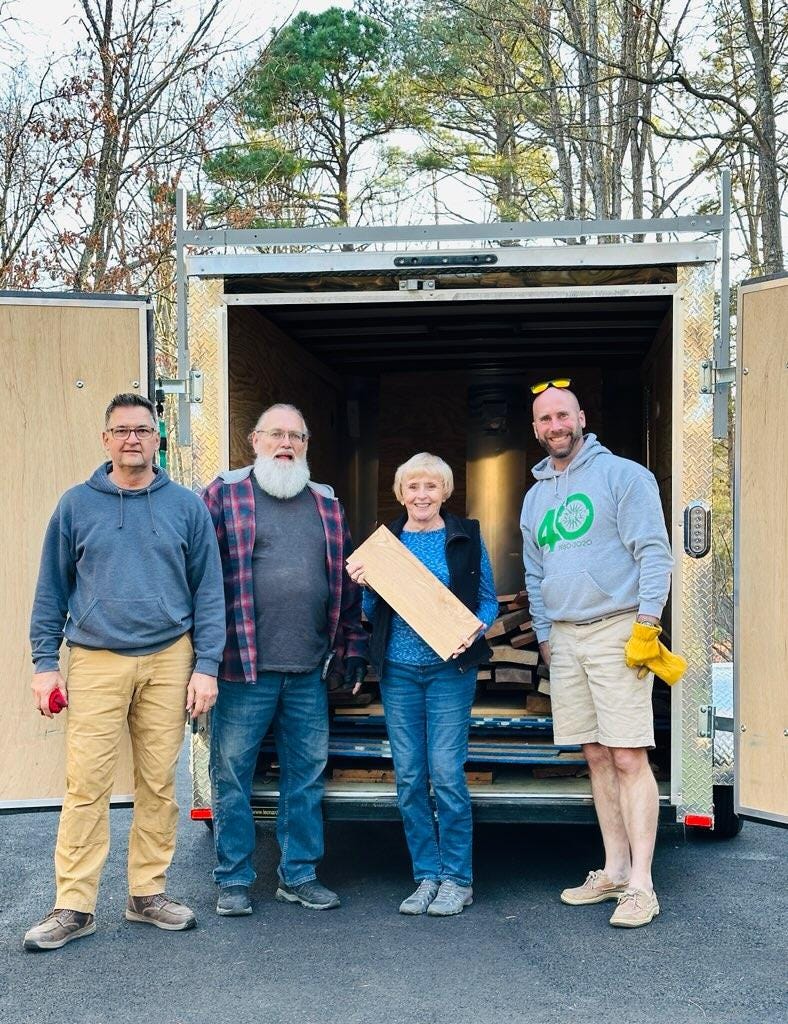I had another opportunity to receive some tools from a widow that belonged to her late husband this past week. He was an aerospace engineer who did a little bit of woodworking during his retirement. The tools weren’t worth a lot but still, he had some cool stuff that would be nice to have in the shop. And frankly, it didn’t matter if it wasn’t top shelf tools, my students were going to appreciate it anyway.

Bill dropped off a few tools for my students. He’s been downsizing his tools lately so he gave me a type 16 no. 4 hand plane, a small dovetail saw, a scratch stock, and a couple of brass dogs. All in great condition.
In Joe’s case, he gave me warning two months before he finally made a decision to have me show up to his house with my trailer and empty his garage of his small woodworking shop. It included a contractor’s size table saw, a drill press, router table, 10 inch bandsaw,... some great tools to pass along to my students and some to add to our tool crib.
These are just a few people who have supported me and my students.
Thankfully in my area I’ve built a relationship with the Fredericksburg Woodworkers Guild and they look out for me and my students. They’ve helped to connect me with people who are downsizing or need to remove tools and material from their homes. What I didn’t need or have room for in my school shop, is passed along to students to help them start to build their tool collection at home.
I won’t lie, it’s bittersweet removing these tools from their homes. It’s a little sad to see people who have enjoyed woodworking realize that they won’t be doing it anymore or people giving away tools that belong to a relative who has passed (many times their spouse). But there’s also an excitement when I think of the prospect of using these tools in the school shop to help us build and create or seeing the joy in my student’s faces as they receive tools that they can take home and use.
It feels good every time I use tools that someone has given me/us. It feels uplifting to have people who believe in us and our endeavors and these gifts of tools and material are some of the greatest ways to support us. I shared a post about The Value of Support mid January but this goes even further than that. There’s also a sense of remembrance as I think of the people that these tools belonged to, especially my family members and close friends. I wouldn’t say it was anything spiritual or that I felt their presence like the movie Ghost but it’s usually a memory of them while I’m working.
Shop classes that are the most successful rely on outside help. The budget given by the school covers the bare minimum and sometimes not even that. With the rise in lumber and material prices, it can be quite a challenge to come up with meaningful projects for the students that don't use a lot of material. And some of these shop classes can have upward of a hundred and twenty students in their programs. Shop classes need support from the community if we want them to be meaningful. I implore you to pass along your tools and extra material or help your fellow woodworkers to pass along their tools and material to the youth, who are our future.
I’ve passed along tools that were once mine to a couple of students and I hope that they might think of me and feel my support for them and their dreams.

A good article that emphasizes the importance of encouraging and, when possible, helping the next generation of woodworkers get started in the craft, with tools and materials.
One of the ironies of woodworking is that, for most hobbyists, at least, it is a mostly solitary endeavor, yet one has a golden opportunity to improve one's skills most effectively and efficiently by relying on others, whether in classes, in an online woodworking forum, via woodworking videos, books, and magazine articles, or at tool-related gatherings and activities, such as Lie-Nielsen's tool demonstrations.
It is most unfortunate that many of the education system bureaucrats see fit to under-fund shop classes, perhaps because they do not fit in well with the current trend of college prep classes and (heavily) pushing students toward college, when, for many of those students, a career in one of the trades would be much more beneficial and satisfying.
Anyway, I find your writings interesting and very much worth reading, particularly as you include your perspective as a woodworking shop class teacher, with all of its unique requirements and challenges. That perspective has given me, as a woodworking instructor in an adult membership community workshop/maker space type of operation catering largely toward beginning woodworkers, more than one opportunity to think about woodworking from directions that I had not previously considered.